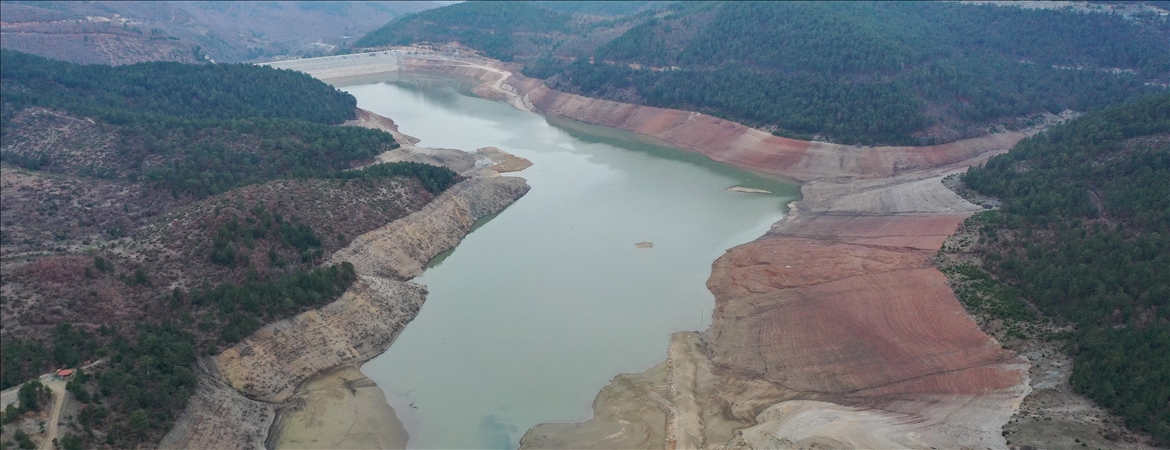
Scientists modelling the effects of climate change and population growth in Bursa with artificial intelligence have calculated that by the end of the century, the monthly amount of water per capita will decrease from an average of 11,479 litres to 3,770 litres.
Scientists from Bursa Uludağ University and Çanakkale Onsekiz Mart University investigated the risks of water scarcity and drought in Bursa with field research and artificial intelligence modelling studies lasting 2 years. According to the results of the research based on climate and population projections for 2020-2049 and 2070-2099, while the amount of water per person per month was 11 thousand 479 litres between 2007-2019, which is the reference period, this amount will decrease to 5 thousand 400 litres in the 2020-2049 period, with an increase of 28 percent in the population and an increase of 1.5 degrees in air temperature. In the 2070-2099 period, which is the long-term scenario, it was determined that the population will increase by 90 percent, the temperature will increase by 2 degrees and the amount of water per capita will decrease to 3,770 litres per month. In the research, which predicts that the pressure on water resources will increase due to increasing population and decreasing precipitation, it was emphasised that efficient use of existing resources is essential to deal with the problem of water scarcity.
The coordinator of the research and Bursa Uludağ University Faculty of Arts and Sciences, Department of Geography Faculty Member Assoc. Prof. Dr. Abdullah Akbaş told AA correspondent that they expect climate change to increase the number and severity of weather events such as drought and extreme precipitation. According to the climate classification system, the area starting from Kocaeli in the west of Turkey, including the coastal and inland parts, extending to Hatay and from there to the southeastern part is classified as Mediterranean climate, Akbaş stated that they chose Bursa as the study area due to the dominance of the Mediterranean climate and the high population growth rate.
‘THERE IS A THREAT OF WATER SHORTAGE IN EVERY REGION OF THE COUNTRY’
Akbaş said, ‘In macro terms, 2/3 of our country falls under the Mediterranean climate. Since it is a very fragile climate, it is one of the places that will be most affected by climate change. In our country, apart from the Mediterranean climate, continental, Black Sea and transitional climates between them are dominant. Modelling studies show that the Mediterranean climate will further expand its area in the future and will dominate in a large part of our country. Therefore, there is a danger of drought and water scarcity in all regions of our country due to climate change and population growth.’
Akbaş mentioned that the existing water resources are insufficient due to the increasing population in areas dominated by the Mediterranean climate, apart from the effects of climate change, and stated that a similar situation is in question in Bursa and that the water held in the dams is in a decreasing trend. Akbaş said, ‘The most important output of our study is the result that there will not be enough water if this continues. Based on our findings, decision-makers may make inferences such as that water will not be enough, other measures should be taken and different policies should be developed regarding the population in this area.’
WATER MANAGEMENT MUST BE TAKEN INTO ACCOUNT!
Emphasising that research shows that Turkey will be exposed to the effects of climate change such as excessive precipitation, extreme temperatures and drought, Akbaş stated that they have developed an artificial intelligence-based method and that this method can be easily applied in many cities of Turkey by considering parameters such as physical geography conditions, climate and topography in order to reduce the effects of climate change on water consumption. Akbaş warned that water management should be taken into account together with population and economic activities in a place, and if this is not taken into account, cities will be affected by climate change too much, and said, ‘If you make your socioeconomic development by adapting to climate modelling and water management, you may not be affected by many things such as mega droughts.’
Reminding that international meetings were held against climate change and decisions were taken in these meetings, Akbaş criticised that these processes were very slow. Akbaş concluded his words as follows: ‘Our problem is global, but our answers are always national. How can we respond to this? Both the climate is changing and the population is increasing, so urban and population policies are very important here. If you harbour more population than the carrying capacity of your city, this means that the water you have provided with various investments will start to decrease with climate change and will never fully meet the demand of the increasing population.’
